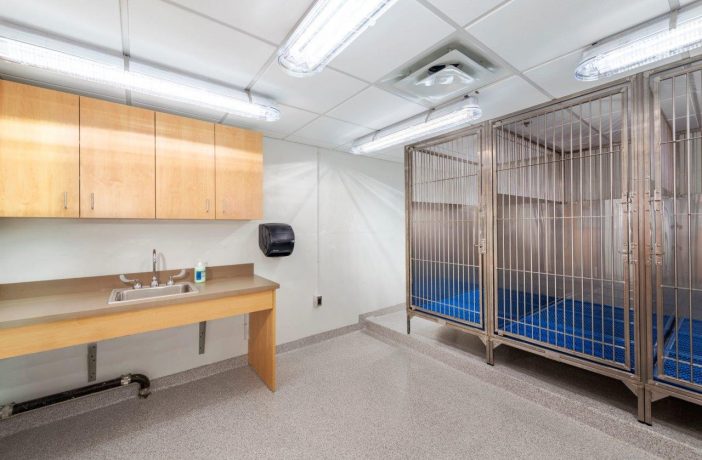 At Johns Hopkins University’s McQueen Laboratory, members of the Quantum Materials Research Group have made groundbreaking advances in the development of advanced crystals for use in electronics.
At Johns Hopkins University’s McQueen Laboratory, members of the Quantum Materials Research Group have made groundbreaking advances in the development of advanced crystals for use in electronics.
To continue those scientific advancements, however, the principal researcher required three custom-designed, high-temperature furnaces … and a skilled construction crew to renovate his lab to support them.
“This was a mechanically and electrically intensive project,” said Nick Funk, Small Projects Division Estimator.
To support the furnaces, Plano-Coudon and its subcontractors completed extensive mechanical and electrical upgrades within the 1,300 SF lab, including installing supplemental cooling, expanded chilled water systems, two lab gas loops, and several large, safety switches. When the furnaces began to arrive, Plano-Coudon coordinated with the manufacturers (one in Germany, the other in the Japan) and the project’s design engineer to make further adjustments to systems to meet unexpected needs of the customized equipment.
Although the project was small, it took specialized knowledge, dedicated subcontractors, thorough communication and considerable flexibility (to meet both changing requirements and schedules) in order to complete.
Plano-Coudon has leveraged that combination of abilities to successfully deliver an array of laboratory projects. Those have included a Level 3 biosafety laboratory at University of Maryland College Park; oncology, radiology and pathology labs at the UMD Baltimore School of Medicine; a vivarium; MRI facility; and multiple forensics, general sciences, graduate research and other teaching labs on university campuses.
This fall, Plano-Coudon completed a gut rehab of 5,000 SF of laboratory space at JHU’s Levi Hall. The project included installing a new chilled water loop, chilled beams, heated water system, baseboard heaters, a new heat exchanger in the penthouse and the infrastructure to connect it to the lab three floors below. Crews built a teaching lab, graduate research area, microscope rooms, cold rooms, molecular biology rooms, tissue culture labs, conference room, offices and a student lounge. The project team completed all demolition and construction in less than five months and without interfering with the operations of other research labs and teaching facilities within the building.
“There was a $2-million microscope on the floor below us so any penetrations had to be closely coordinated with the facilities department,” said Mark LaPenna, Project Manager.

Over the years, Plano-Coudon has developed strong partnerships with subcontractors who have special expertise and ample experience in laboratory projects, said Cliff Milstead, Project Executive. That expertise covers installation of laboratory equipment, ranging from one-of-a-kind crystal furnaces to all the gas lines, compressed air outlets and fume hoods required in a teaching lab. That expertise also includes meeting the special mechanical, electrical and plumbing needs of laboratories and completing those improvements within an occupied research facility.
Plano-Coudon has developed processes to handle often-challenging aspects of laboratory projects, such as identifying and obtaining long-lead-time items. Plano-Coudon project managers and superintendents have also become very adept at the extraordinary communication and coordination needed to manage renovations and outages in occupied facilities, Milstead said.
For example, Plano-Coudon is nearing completion on a multi-year contract for massive electrical and mechanical upgrades as well as interior renovations throughout the University of Maryland’s 14-story Medical Sciences Training Facility (MSTF) in downtown Baltimore. The building operates 24/7/365 and houses numerous research laboratories, including animal facilities, areas for light-sensitive experiments, and specialized freezers that have to maintain temperatures as low as minus 50 degrees.
“That project has required a ton of shutdowns and a ton of coordination to pull them off,” said Craig Pool, Senior Project Manager.
Yet the project team has successfully completed more than 15 shutdowns, including one that spanned two days. The company even received a thank-you letter from the university’s Facilities Management Design and Construction department that described Plano-Coudon’s handling of a major shutdown as “one of the best examples of teamwork that I have seen.”
